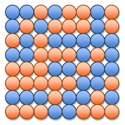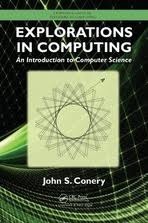

|
15110
SUMMER SESSION ONE - 2013
|
Fast Links: Instructors | Assistants | Meeting Times | Textbooks | Grades | Academic Integrity | Students with Disabilities
15110 is a course in fundamental computing principles for students with little to no computing background. Programming constructs: sequencing, selection, iteration, and recursion. Data organization: arrays and lists. Use of abstraction in computing: data representation, computer organization, computer networks, functional decomposition, and application programming interfaces. Use of computational principles in problem-solving: divide and conquer, randomness, and concurrency. Classification of computational problems based on complexity, non-computable functions, and using heuristics to find reasonable solutions to complex problems. Social, ethical and legal issues associated with the development of new computational artifacts will also be discussed. Prerequisites: none.
NOTE: Speak with your advisor about whether you are required to take 15110 or 15112 (Fundamentals in Programming) or both if you are unsure about which course you should be taking.

|
Dr. Tom Cortina Email: tcortina "at" cs.cmu.edu Office: Gates Hillman Center 4117 Office Hours: MTWRF 9:30-10:20AM and by appointment (except campus holidays/breaks) Phone: 412-268-3514 |
Jessica Virdó - andrew id: jvirdo
Andrew Yee - andrew id: ajyee
You can go to any course assistant listed above for help with the course material in our sections. In addition, some of your work will be graded by the course assistants. If you have any questions about a specific grade given by any CA, you should try to meet that CA during his/her office hours for assistance. If you cannot meet a specific CA during his/her office hours for grading questions, please email that CA for a special appointment. (See EXTRA HELP for the schedule for extra help hours for course assistants.)
You are required to go to your assigned lecture and lab. Since part of your course grade depends on lab participation, you must go to your assigned section to get lab credit.
| Lecture | MTWRF 10:30-11:50AM | GHC 4211 |
| Lab/Recitation | MTWRF 4:30-5:50PM | GHC 5201 |
The following textbook is required. Additional information about each topic we cover in class is found in this textbook so if you want to get a better understanding of the course material, you are encouraged to read the corresponding sections of the textbook. At least one copy of this textbook will be available on reserve in the library in Wean (4th floor) for use in the library only.

|
Explorations in Computing: An Introduction to Computer Science by John Conery Publisher: CRC Press (2011) ISBN: 978-1439812624 |
This textbook is available in the campus bookstore. The book is also available from CRC Press directly at a 20% discount (use discount code 888FX at checkout) or as an e-book directly from Vital Source at a 31% discount.
In addition to the course textbook, there will be additional readings from the following book:

|
Blown To Bits: Your Life, Liberty, and Happiness after the Digital Explosion by Hal Abelson, Ken Ledeen, and Harry Lewis Publisher: Addison-Wesley (2008) ISBN: 978-0137135592 |
This book is available FOR FREE from http://www.bitsbook.com/. You can buy a hardcopy of this book if you wish from any major bookseller.
Course Grading
All assignments must be handed in on time (unless you are
given instructions otherwise).
Late or missing work will receive a 0.
The reason this is
done is so that we can get feedback to you as quickly as
possible so you can learn from your mistakes and prepare for the exams.
Additionally, it allows us to post a sample solution
as soon as possible for the benefit of all students.
You are allowed to drop 1 written assignment
and 1 online/programming assignment without
penalty (except where noted). You are
still responsible for understanding
the material on the dropped assignments.
See the ASSIGNMENTS
page for detailed information about this grading policy.
You must take all exams (written and lab exams) at the times they are given. NO MAKEUPS FOR EXAMS will be allowed except for acceptable documented circumstances (e.g. major illness, death in immediate family, university-sanctioned event with verification from advisor/coach, etc.).
Your course grade will be calculated based on the following:
Homework Assignments: 30%
Lab Participation: 5%
2 Lab Exams: 10% (5% each)
2 Written Exams: 30% (15% each)
Final Exam: 25%
Grades from all assignments and exams may be reviewed for up to 2 days after they are returned/posted. After this period, the grade is considered final and cannot be changed. We reserve the right to review an entire assignment/exam if it is submitted for re-grading.
The value of your degree depends on the academic integrity of yourself and your peers in each of your classes. It is expected that, unless otherwise instructed, the work you submit as your own will be your own work and not someone else's work or a collaboration between yourself and other(s).
Please read the University Policy on Cheating and Plagiarism carefully to understand the penalties associated with academic dishonesty at CMU. In this class, cheating/copying/plagiarism means copying all or part of a program or homework solution from another student or unauthorized source, knowingly giving such information to another student, or giving or receiving unauthorized information during an examination. In general, each solution you submit (program code, written homework or exam) must be your OWN work. In the event that you use information written by another person in your solution, you must cite the source of this information (and receive permission if required).
Your course instructor reserves the right to determine an appropriate penalty based on the violation of academic dishonesty that occurs. Violations of the university policy can result in severe penalties including failing this course and possible expulsion from Carnegie Mellon University. If you have any questions about this policy and any work you are doing in the course, please feel free to contact your instructor for help.
Individuals with documented disabilities may be eligible to receive services/accomodations from CMU's Equal Opportunity Services (EOS) office. For more information, please contact Larry Powell, Manager of Disability Services at (412) 268-2013 (voice/TTY).